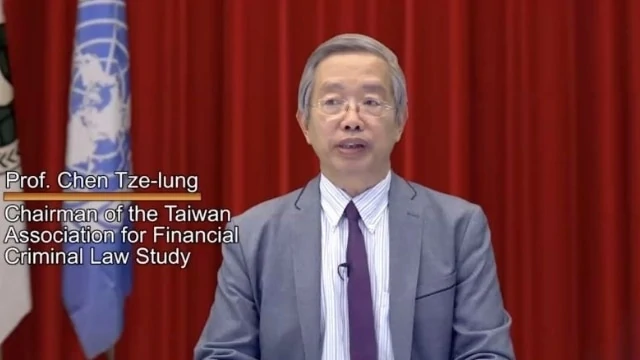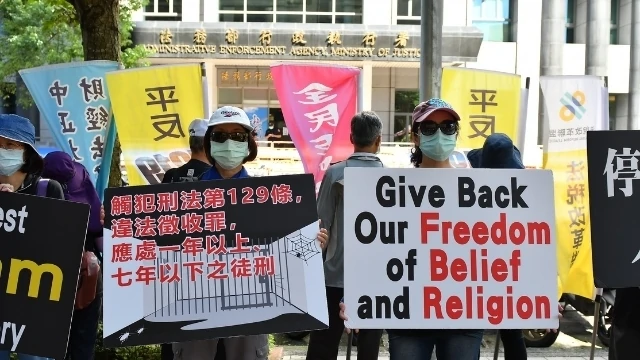On January 24, scholars from different continents discussed how to educate to freedom of religion or belief, conscience, legality, and fiscal fairness.
by Marco Respinti

Dr. Chen Tze-lung speaking at the webinar.
Every year, on January 24, the world celebrates the International Day of Education. It is usually an opportunity to remind how many children still do not have access to education due to poverty, oppression by totalitarian regimes, and now also the impact of the COVID-19 pandemic. Education, however, is a word with multiple dimensions. Citizens should also be educated to protect their human rights, including freedom of religion or belief, against injustice vested on them by governments and bureaucrats. And governments themselves should be educated to respect human rights, and regard the sphere of independence of individuals, families, and organizations as a “no-fly zone” they should learn not to violate.
One of the important initiatives preparing the International Day of Education was the conference “Education and the Challenges of the Multicultural World,” organized on January 21–22 in Warsaw, Poland, by The Maria Grzegorzewska University under the patronage of UNESCO. Several papers there were devoted to education to freedom of religion or belief, and six mentioned the Tai Ji Men tax case in Taiwan, including one by Bitter Winter’s editor-in-chief, Massimo Introvigne.
Massimo Introvigne speech at the Warsaw conference.
The same theme was discussed in-depth at a webinar co-organized by CESNUR, the Center for Studies on New Religions, and Brussels NGO Human Rights Without Frontiers, on “Education, Conscience, and Tax Justice: Reflecting on the Tai Ji Men case in Taiwan.” The webinar both celebrated the International Day of Education and introduced a new book, “Who Stole Their Youth?”, just published in Mandarin and soon to be translated into English.
The full video of the Webinar.
Massimo Introvigne introduced the webinar and the volume, noting that it is really three books in one: a detailed summary of the legal case, a practical guide for citizens on how to defend themselves against bullying by bureaucrats, and a chronicle of a “lost generation” of Tai Ji Men dizi (disciples). They hoped to devote their youth to learning qigong and taking to the world traditional Chinese culture and the movement’s message of peace and love, yet had to spend time in the streets protesting against persecution and injustice. A video where a co-author of the book shared her experience was then presented.
About the book “Who Stole Their Youth?
Discriminating against spiritual minorities through taxes does not happen in Taiwan only, although the Tai Ji Men legal case is unique, as it lasted for 25 years and is still not resolved today. Boris Falikov, a professor at the Center for Religion of Russian University for Humanities in Moscow, and Christine Mirre, deputy director of the ECOSOC-accredited NGO Coordination des associations et des particuliers pour la liberté de conscience, compared the Tai Ji Men case in Taiwan to the discrimination against religious minorities in Russia and France. In Russia, Falikov warned, the government started accusing certain groups of tax evasion, and then escalated to label them “extremist” and ban their activities. In France, Mirre said, local courts refused to protect groups labeled as “cults” against illegal tax bills, until they were able to take their cases to European Court of Human Rights, who ruled in their favor.
I then introduced a roundtable featuring Taiwanese legal experts and dizi who testified about their personal experience. Ms. Chang Mei-Ying, a counseling teacher in Taiwan and co-author of the book, argued that painful memories should not be hidden. When the Tai Ji Men case started in 1996, parents were harassed, and in some cases arrested, and children were bullied in school. The events affected dizi across generations, and led young people like Chang to study tax cases and conclude that their experience in Taiwan was unfortunately not unique, as others were also victims of tax injustice.

Dr. Chen Tze-lung, chairperson of the Taiwan Association for the Study of Financial Criminal Law, called on International Day of Education to emphasize three kinds of education. First, human rights education for all citizens, who should learn that government officials are not always right. Second, education on the principle of legality for bureaucrats, who should learn to respect the rule of law. Third, education for prosecutors to respect the rules of evidence and the duty not to use the media to prejudice the public opinion against defendants, two principles that were clearly breached in the Tai Ji Men case.
Dr. Huang Chun-Chieh, a professor at the Department of Financial and Economic Law at National Chung Cheng University in Taiwan, lamented that legal education in Taiwan often remains theoretical, and does not teach practical wisdom to government officers, particularly those of the National Tax Bureau (NTB). They were not educated enough to understand the traditional relationship between dizi and their shifu (Grand Master) in a menpai (similar to a “school”) of Qigong such as Tai Ji Men, which led to catastrophic mistakes when the bureaucrats mistook for tuition fees what were in fact gifts from disciples to master. The ignorance of NTB bureaucrats was so deep that they did not understand, or decided to ignore, even the clear conclusions of the highest courts of law in Taiwan.
Ms. Jaicy Hsu, a patent engineer from Taiwan and a dizi, offered an emotional, moving testimony of how her parents and herself suffered because of the vast campaign of media slander against Tai Ji Men orchestrated by Prosecutor Hou Kuan-jen, who started the case in 1996. As a victim, she started studying both what happened to Tai Ji Men, discovering an incredible amount of bad faith by Prosecutor Hou and some tax bureaucrats, and how difficult it is for taxpayers to react. Hsu said, in Taiwan a caution of half the contested amount should be deposited to avoid compulsory enforcement of the taxpayer’s properties.

Dr. Linda Chen, a post-doctoral research associate in the Department of Pathology of Dalhousie University, Halifax, Nova Scotia, Canada, told of her good experience as a dizi, which also made obvious to her that gifts to the shifu were for “education” in a broad sense, and it was absurd to regard them as tuition fees. In Tai Ji Men, Chen said, she learned the concept of lifelong education, which is so important for her but should be extended to all citizens.
Mr. Duncan Lee, CPA, an accounting consultant in the United States and a dizi, reflected on the sad story of how journalists believed the tall tales and fake news of Prosecutor Hou without ever questioning him, and even if courts of law later concluded that his allegations were not true. This led to an enormous amount of discrimination against Tai Ji Men dizi and their children in schools and workplaces, and even dizi living in the United States saw their relationships with relatives in Taiwan poisoned by media slander. Unfortunately, Lee said, Prosecutor Hou never paid the price for his wrongdoings, and was even promoted to a higher position.
In concluding the webinar, Willy Fautré, co-founder of Human Rights Without Frontiers, paid homage to the unsung heroes who took to the street for years, having learned in a hard way the lesson that, if citizens do not defend their rights, nobody would do it for them. In a way, their youth was stolen, but it is also true that it was a youth well spent. As the book “Who Stole Their Youth?” clearly explains, dizi do not fight for money—it would certainly have been less expensive to settle with the NTB than to fight in courts of law and organize protests for decades—but for conscience and justice. They know that, if they give up and accept to pay illegal taxes, rogue bureaucrats will target another movement after them, and then a third and a fourth one, and so on without end. Their sad and joyful protests in the streets, as evidenced by a video they made, are not for Tai Ji Men only but for principles affecting all of us.
A song of the Tai Ji Men protest.
Source: Bitter Winter
